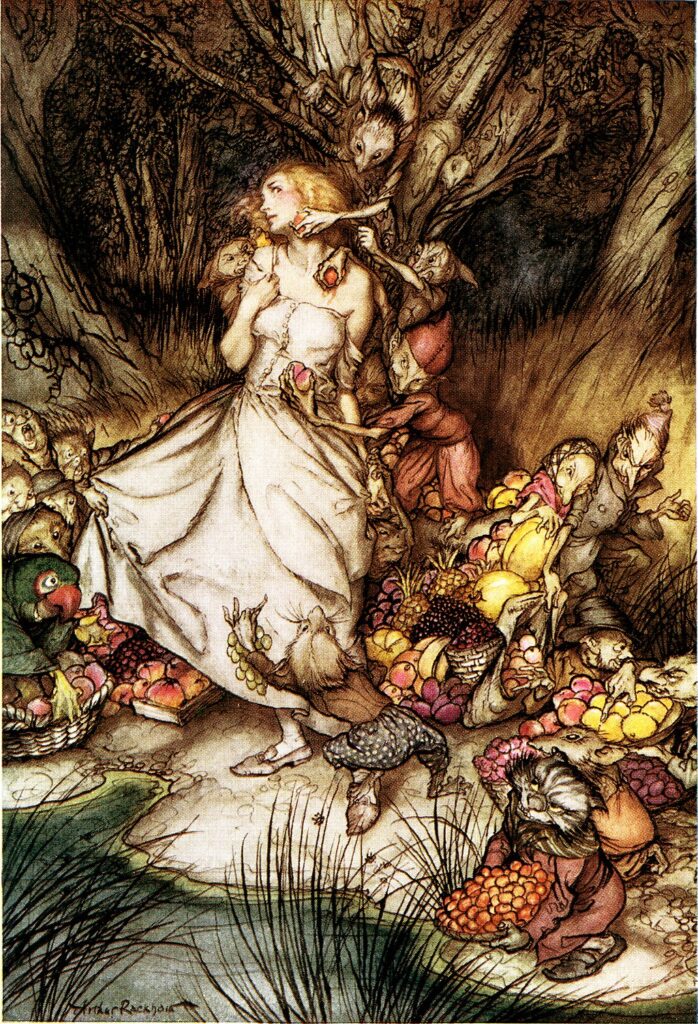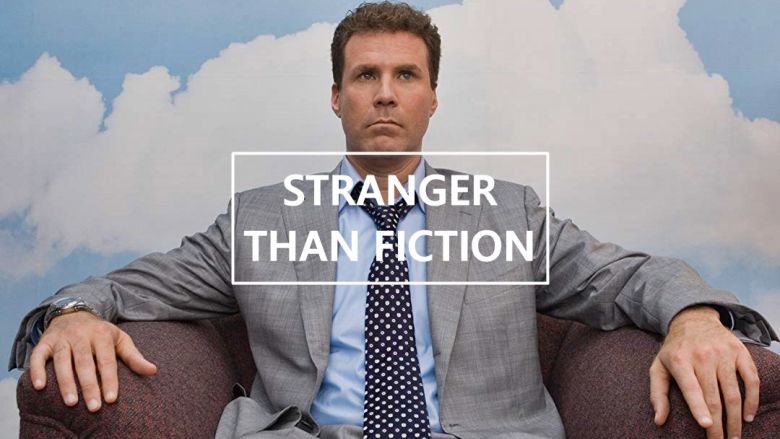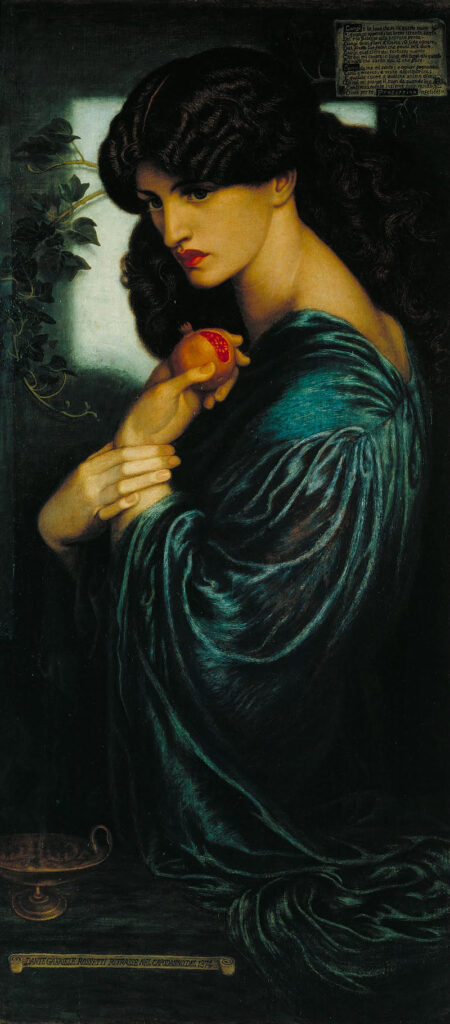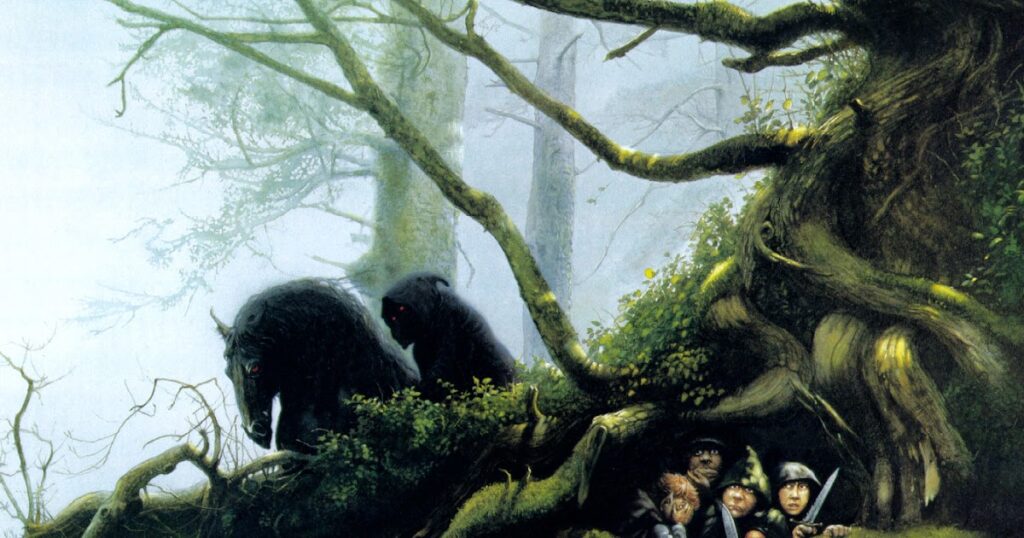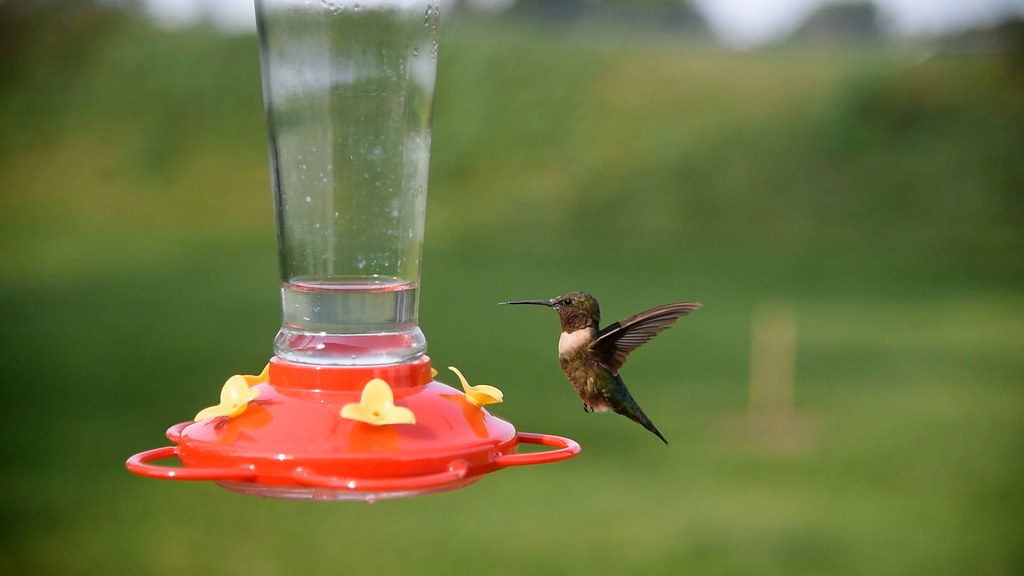Note: If you wish to receive, via e-mail, (1) my weekly newsletter or (2) daily copies of these posts, write to me at [email protected]. Comments may also be sent to this address. I promise not to share your e-mail with anyone. To unsubscribe, write here as well.
Tuesday
“What can an ordinary voter do to maintain engagement with the election while not turning their cerebral cortex into a wet, steaming mess of fused wiring?” asks Tom Nichols in an Atlantic article that speaks directly to many of us. Nichols points out that this is actually Trump’s strategy. To cause disillusion with democracy, “flood the zone with shit,” as Trump whisperer Steve Bannon colorfully puts it.
Among literary characters who show strength and resolve to stand strong in the face of relentless attacks, Lizzie in Christina Rossetti’s Goblin Market comes to mind.
First, however, here’s Nichols expanding on the problem:
By overwhelming people with the sheer volume and vulgarity of his antics, Trump and his team are trying to burn out the part of our brains that can discern truth from fiction, right from wrong, good from evil. His campaign’s goal is to turn voters into moral zombies who can no longer tell the difference between Stormy and Hunter or classified documents and personal laptops, who cannot parse what a “bloodbath” means, who no longer have the ability to be shocked when a political leader calls other human beings “animals” and “vermin.”
And further:
Trump isn’t worried that all of this will cause voters to have a kind of mental meltdown: He’s counting on it. He needs ordinary citizens to become so mired in moral chaos and so cognitively paralyzed that they are unable to comprehend the disasters that would ensue if he returns to the White House.
In Goblin Market, goblins seek to seduce Lizzie and Laura by appealing to their base desires, offering them forbidden fruit. Think of these tempters as “the best and most serious people” who currently surround Trump: Stephen Miller, Paul Manafort, Mike Flynn, Jim Jordan, Jeffrey Clark, and others. Link them up with the following as you see fit:
One had a cat’s face,
One whisk’d a tail,
One tramp’d at a rat’s pace,
One crawl’d like a snail,
One like a wombat prowl’d obtuse and furry,
One like a ratel tumbled hurry skurry.
So what base desires does Trump appeal to? Well, resentment, sadism, fear, and the urge to dominate, among others. And what must they offer up in return? In Laura’s case, it’s a lock of her golden hair—which is to say, her innocence, her purity, her integrity. And at first, she is as exhilarated as Trump supporters upon first encountering him:
She dropp’d a tear more rare than pearl,
Then suck’d their fruit globes fair or red:
Sweeter than honey from the rock,
Stronger than man-rejoicing wine,
Clearer than water flow’d that juice;
She never tasted such before,
How should it cloy with length of use?
She suck’d and suck’d and suck’d the more
Fruits which that unknown orchard bore;
She suck’d until her lips were sore;
Then flung the emptied rinds away
But gather’d up one kernel stone,
And knew not was it night or day
As she turn’d home alone.
Yes, there is a heady feeling when one has sucked upon Trumpian fruit. The problem , however, is that it leaves one a shell of one’s former self, a robot who can respond only to Trump’s trigger words. There are, in the United State, cultists who are so in thrall to the man that they have cut themselves off from their spouses, partners, children, grandchildren, relatives and friends, not to mention from humanity generally. We see in Laura the effects of such surrender:
But when the noon wax’d bright
Her hair grew thin and grey;
She dwindled, as the fair full moon doth turn
To swift decay and burn
Her fire away.
Now to Lizzie, who refuses to succumb to the goblin men as she goes to the aid of her sister. What truly sustains us, we learn, is not forbidden fruit but love. But this love requires courage and Lizzie encounters the kind of hate that, as we have learned to our sorrow, Trump cultists are only too willing to dish out to anyone who disagrees with them:
Their tones wax’d loud,
Their looks were evil.
Lashing their tails
They trod and hustled her,
Elbow’d and jostled her,
Claw’d with their nails,
Barking, mewing, hissing, mocking,
Tore her gown and soil’d her stocking,
Twitch’d her hair out by the roots,
Stamp’d upon her tender feet,
Held her hands and squeez’d their fruits
Against her mouth to make her eat.
And further on:
One may lead a horse to water,
Twenty cannot make him drink.
Though the goblins cuff’d and caught her,
Coax’d and fought her,
Bullied and besought her,
Scratch’d her, pinch’d her black as ink,
Kick’d and knock’d her,
Maul’d and mock’d her,
Lizzie utter’d not a word;
Would not open lip from lip
Lest they should cram a mouthful in…
And now to the passage I have in mind about standing up to Trumpist attempts to short-circuit our brains. It takes Lizzie’s resolve to stay firm and keep our eyes on the prize:
White and golden Lizzie stood,
Like a lily in a flood,—
Like a rock of blue-vein’d stone
Lash’d by tides obstreperously,—
Like a beacon left alone
In a hoary roaring sea,
Sending up a golden fire,—
Like a fruit-crown’d orange-tree
White with blossoms honey-sweet
Sore beset by wasp and bee,—
Like a royal virgin town
Topp’d with gilded dome and spire
Close beleaguer’d by a fleet
Mad to tug her standard down.
Compare this with Nichol’s advice on how we should respond to Trump:
The way to withstand Trump’s daily assaults on our senses is to regard them with fortitude, and even some stoicism. He’s trying to shake our confidence in democracy and basic decency; remaining engaged in civic life, calmly and without stooping to such tactics and rhetoric, is the superpower of every citizen in a democracy.
Plotwise, Lizzie allows Laura to lick the fruit juice she has accumulated off her face, where it works as an antidote to Laura’s addiction. In other words, love conquers base desire. Or in our case, love of “democracy and basic decency” can overcome (or so we can hope) fascistic temptation.
We dream that those Americans who have been led astray by this temptation will abandon the cult and return to the family and friends they have rejected. For her part, Laura, after having gone through an intense inner struggle, finds her way back:
Laura awoke as from a dream,
Laugh’d in the innocent old way,
Hugg’d Lizzie but not twice or thrice;
Her gleaming locks show’d not one thread of grey,
Her breath was sweet as May
And light danced in her eyes.
I have experienced a loved one who was once taken over by a cult. During his junior year in college my son Justin joined a rabid fundamentalist church, which made prickly his ties with his family (especially when he told one of his brothers that he was going to hell). Once he asked me if I “had been saved,” even though he knew I attend church weekly. Apparently Julia and I weren’t Christian enough for him.
He was still a lovely man, however, and he would still give out hugs. Whenever I saw him around campus (he was attending the college where I taught), I refused to argue with him but instead saw myself ducking beneath the branches to embrace the trunk. What was most important was the love I had for him.
That’s how Lizzie saves Laura, who years later tells her children,
For there is no friend like a sister
In calm or stormy weather;
To cheer one on the tedious way,
To fetch one if one goes astray,
To lift one if one totters down,
To strengthen whilst one stands.
I will never know if my love would have helped Justin to a more balanced perspective because he drowned on April 30 in a freak accident. (I take some consolation from his friends reporting that he was starting to soften not long before then, as if he had had to experiment with total religious immersion before arriving at his own faith.) Likewise, I don’t know whether our caring for family and friends who have sold out to Trump will ever bring them back. We can only control what what we ourselves do, not how they will respond. Like Queequeg in Moby Dick, we throw our caskets into the sea and hope that our Ishmaels will find them in time.
